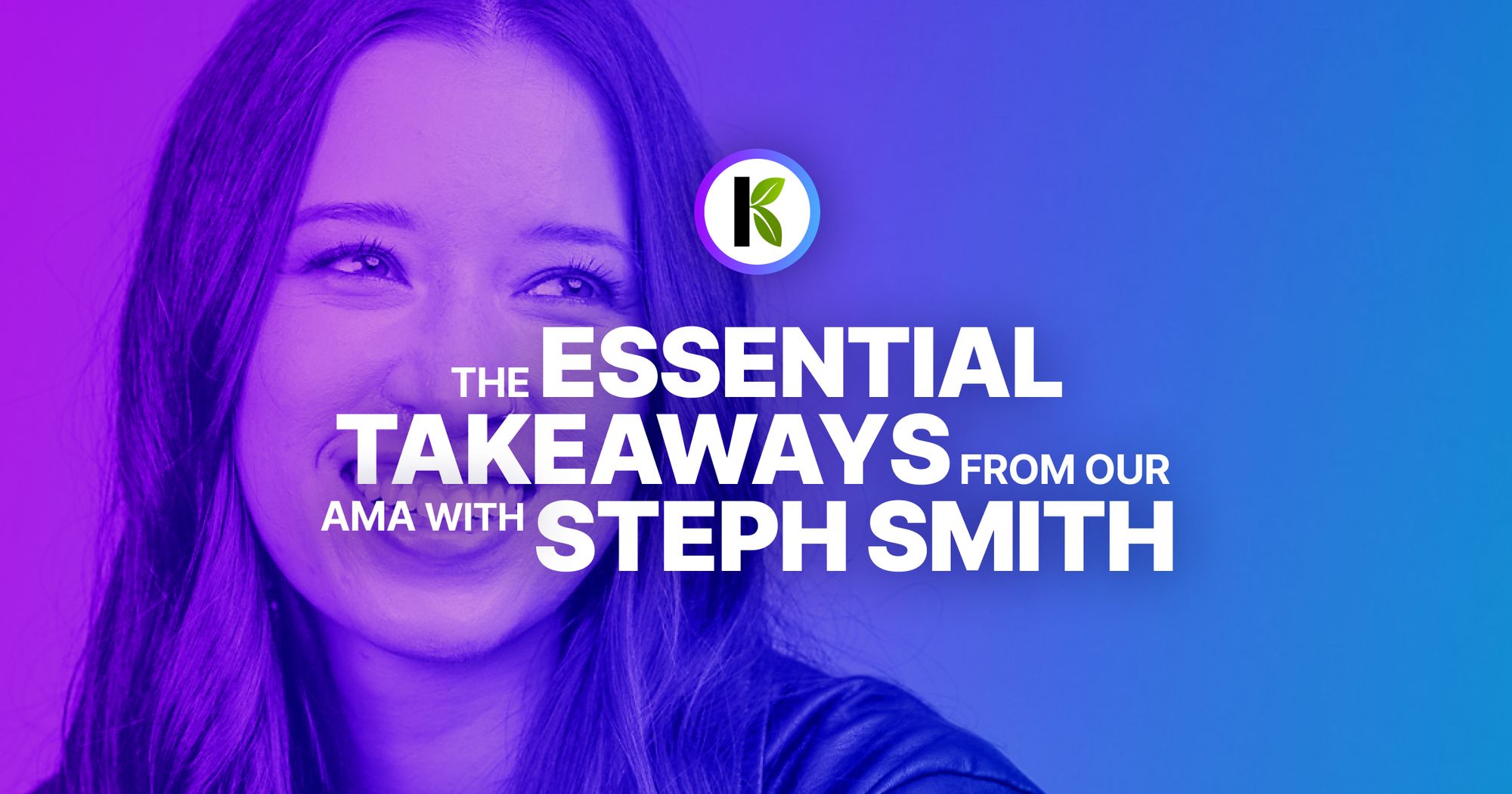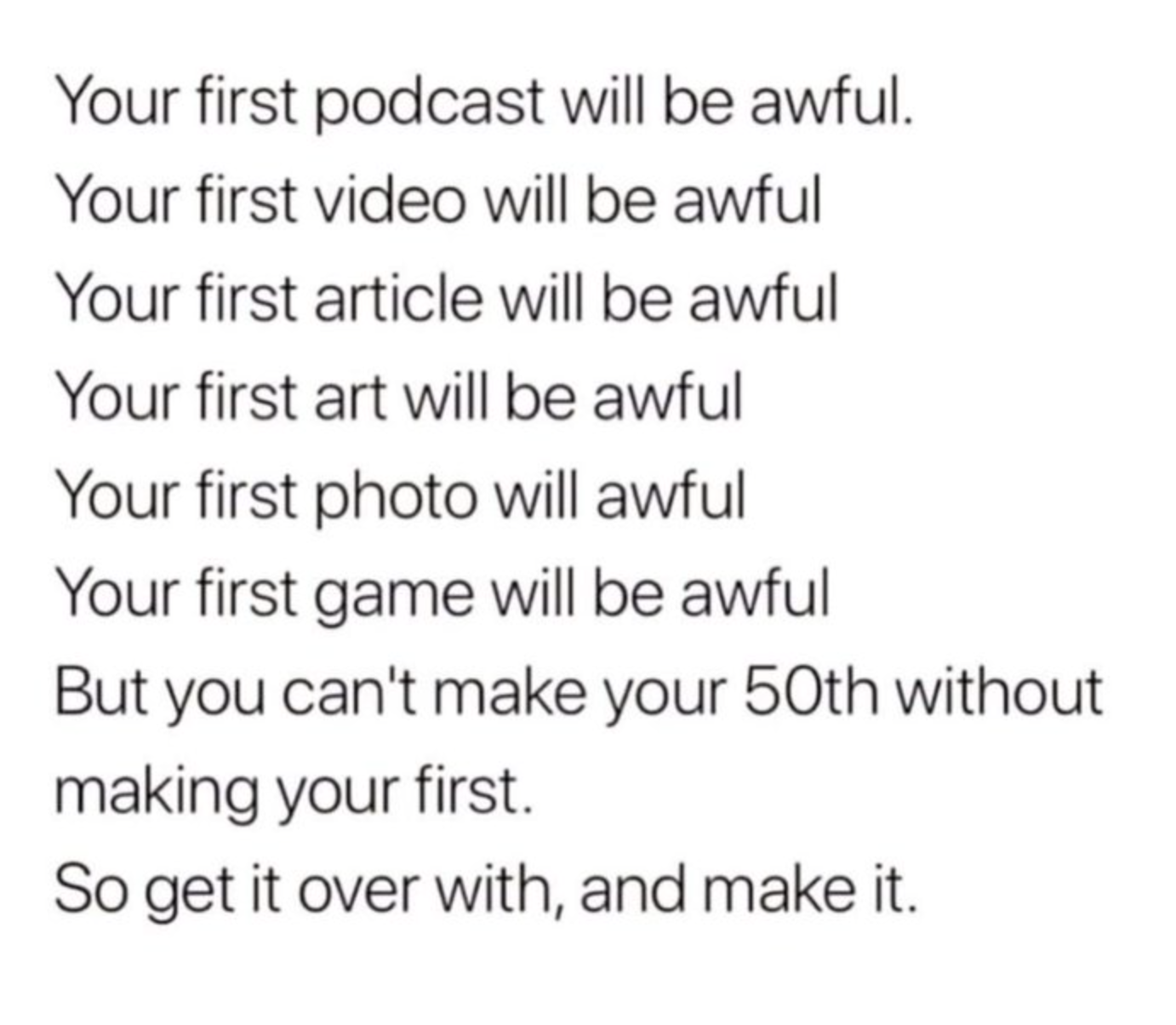🔑 The Essential Takeaways from a16z's Steph Smith

Steph Smith is a writer, podcast host for a16z, self-taught developer, and recent book author who has sold over 220,000 copies of her book "Doing Content Right."
Recently, Steph joined us for a member-exclusive AMA 👀 😎 to share her insights on content creation, building a personal brand, writing a book, productivity, and priority hacks for building meaningful projects.
She's a rad builder who gets sh*t done.
We took the top insights and served them up for you below in digestible and hopefully tactical tips.

Building a Personal Brand
Braden Barwich: "What advice you’d have for someone that’s busy at a SAAS Startup in a director of sales role and what tactics I could work on to slowly build my personal brand/voice on Twitter so I can land more opportunities in the future like advising startups, speaking ad clearing about investing. What would be your no-filter advice?"
Steph: First and foremost, don't overthink it. Your personal brand is going to evolve over time so just get started. The no-filter advice would be for you to ask yourself a few of these questions. And be honest with yourself!
1. What am I genuinely excited about?
2. What do people tend to come to me for?
3. Of the content I already create, what would I follow if I was a third party?
And finally, start sharing ASAP! You'll learn more as you get more data. You don't become good at building a brand by watching other people build one.

Paul Donnelly: What's the biggest mistake most people make when starting their blog/newsletter? 🤦♂️
Steph: The biggest mistakes people make when starting a blog or newsletter are focusing on what their content is about instead of how it's different and starting with a newsletter alone without any form of distribution.
Differentiate oneself via both the "what" and "how" when creating content. The "what" refers to talking about a subject no one else is, while the "how" refers to focusing on the execution of content delivery. They suggest testing this out by asking yourself why someone should subscribe to a newsletter or listen to a podcast.
As you evolve into a double Podcast host and continue to grow your city-sized Twitter following, I am sure you have learned some skills/tools for finding and presenting information in a concise way. This probably dates back to your days researching at Trends, but what are some of these frameworks/tips that you wish you learned earlier?
Steph: Many people think length = high quality. In fact, conveying an idea well in as few words as possible = high quality. When possible, consider when you can use images/charts (remember: a picture is worth a thousand words) or video (remember: a video = worth a thousand pictures.

Use platforms like Twitter to test ideas before jumping into something longer form. Tweet < blog post < book < movie in terms of effort. You'll be surprised by what people adhere to vs not.
Use data when you can. Instead of trying to guess what people want, use tools like Subreddit Stats, Similarweb, Google Trends, or JungleScout to vet how people are engaging with stuff that already exists on the web, instead of trying to guess.
Shail and many others had questions about productivity and compartmentalization.
How do you compartmentalize all the different projects that you're working on simultaneously?
Steph: Try to separate your projects and not work on them simultaneously. I intentionally design projects so they don't drag on and try to focus on projects I am truly passionate about instead of those that may generate money quickly. For all the side hustlers and aspiring entrepreneurs, take a peek at this post I shared You Don't Need to Quit Your Job to Make.
How do you fight the urge to jump onto the next "shiny object" when things that you "committed" to become hard?
Steph: I've actually learned that my psychology (at least currently) is to be able to work really hard on something, and then move on to the next. Now there are macro things I focus on (like my overall brand) or projects that I could see myself building on for a very long time (my website, my podcast). But I think it's okay to be a "zero to one" person, so long as you're actually seeing those projects to a reasonable completion and you have reasonable expectations for your results. Using the book example above, I don't expect it to ever make as much as a cohort-based course that requires a lot more of my ongoing attention.
Finally, I think one thing that has helped me to not have _too much_ shiny-object syndrome is actually having a full-time job. As I talk about in the article linked above, that means I only need to pursue projects that I feel super compelled to pursue, not just because I think it could make a quick buck.
More importantly, I can focus on expressing myself through projects I truly care about, instead of focusing on what may generate $, and through this process, I stay close to my values. In other words, I can focus on creating value, instead of specifically on capturing it.
Tamar asked "What would you say are the biggest drivers for success on Gumroad? Do you think it was the Hustle shoutout? (That did it for me.) Did you leverage other distribution strategies?"
and Steph delivered:
- Building in the open
- Narrow your path to feedback
- Pre-sales
- Delayed Product Hunt launch
- Affiliates
- Lowering friction to consume
- Help people help you
- Tiered pricing strategy
On picking "The Next Big Thing" Steph shares her thoughts on following The Regret Minimization Framework and other helpful tips
Melissa Allen: How do you identify founders (ie what characteristics and qualities do you look for)who you feel you have “what it takes” to successfully scale the startup?
Steph: The "next Google" will not be built by someone paid a fat salary to "build the next Google". It'll be built by someone that sees a problem that they just can't ignore.
The best founders show signs of their ambition in everyday life, even when they're not trying to impress anyone.
It's the side projects that they choose to do just for fun, the hobbies they've obsessed over, the skills they picked up on their own time -- those are proof points of how someone will act when no one is watching. And that's what most days of building a startup are like.
That's also why she thinks it's silly when people look negatively toward candidates with side projects and loves this policy from Palmer Luckey:
Love this policy from @PalmerLuckey: paying for all side project tools.
— Steph Smith (@stephsmithio) November 1, 2022
Rewarding ambition, instead of restricting competition... 🙌
One of the few companies making a true statement with their benefits, instead of broad strokes that effectively target no one (ie: free lunch) pic.twitter.com/XCPsx2p29s
In conclusion, Steph Smith is a wealth of knowledge and inspiration when it comes to content creation, building an audience, writing a book, productivity, and priority hacks for building meaningful projects.
Her advice is straightforward and actionable, and her approach to building a personal brand is refreshingly honest. Thanks for sharing your insights with us, Steph!
Keeping up with Steph 👀
Kernal: https://kern.al/u/stephsmithio
Twitter: https://twitter.com/stephsmithio
LinkedIn: https://www.linkedin.com/in/stephaniesmith93
Website: https://stephsmith.io
Blog: https://blog.stephsmith.io
a16z Podcast: https://a16z.simplecast.com
Latest project: https://keeplearning.buzzsprout.com
We'd love to hear from you.
Who else would you like to see an AMA from on Kernal? Nominate a Guest. Want to be an AMA guest, let us know.
With nearly 10,000 members, 2,000 startup ideas and 200 MVPs, Kernal is an expanding community of founders, operators, and investors focused on validating and building pre-seed startup ideas. Post new ideas, browse startups with momentum, and get expert feedback to take the next steps of scaling your startup idea. This exclusive community is the most supportive place to be for builders at this stage in their journey. We welcome you to join the community.

